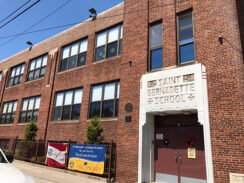
WINDSOR TERRACE — A new $3 trillion coronavirus relief bill passed on May 15 by the House of Representatives is called the HEROES Act, but Catholic leaders said some aspects of the bill are not heroic at all.
Buried deep within the massive 1,800-page bill are provisions that would hurt Catholic schools, advocates charged.
The U.S. Conference of Catholic Bishops urged dioceses across the country to call and write to members of Congress to voice their objections to the legislation.
The Health and Economic Recovery Omnibus Emergency Solutions Act, or HEROES Act, would rescind funding protections that non-public schools, including Catholic schools, enjoyed in the CARES Act, a previous coronavirus relief bill.
Under the $2.2 trillion CARES Act, passed by Congress and signed into law by President Donald Trump on March 27, services available to public schools in the bill must be made available to non-public schools.
There is no such provision in the HEROES Act, Catholic leaders said.
“The HEROES Act actually hurts us,” said James Cultrara, director of education for the New York State Catholic Conference. “COVID-19 has affected every school in the country, non-public as well as public.”
The HEROES Act also includes a measure that leaves non-public schools out of a $90 billion funding pot for school aid, although exceptions will be made in certain instances for programs benefiting children with disabilities.
The fate of the HEROES Act, which Cultrara labeled as “one of the worst pieces of legislation we have ever seen,” is uncertain.
The bill, which was championed by House Speaker Nancy Pelosi, passed largely along party lines in the Democratic-led House but Republican Senate Majority Leader Mitch McConnell has stated that the bill will be dead on arrival in his chamber.
In a recent interview on Fox News Channel, McConnell did not mince words, calling the bill “a liberal wish list” and “an unserious product from an unserious majority.”
McConnell’s objections were not based on the non-public school funding issue but on other aspects of the bill that opponents of the legislation charge have little or nothing to do with the coronavirus relief. For example, the bill includes a provision allowing banks to lend money to marijuana growers in states where pot is legal.
The fact that the Senate hasn’t yet taken up the bill is not making Catholic leaders breathe easier. “Bills are always subject to negotiation. This isn’t over,” Cultrara said.
Another critic of the bill, Bishop David O’Connell of Trenton, told Currents News on May 20 that the legislation will hurt already struggling schools in his diocese.
“It’s very detrimental to our ability to survive,” Bishop O’Connell said.
After Bishop O’Connell urged Catholics in his diocese to protest, more than 5,000 emails were sent to Congress.
Fran Vella-Marrone, chair of the Brooklyn Conservative Party and a Catholic, charged that the bill is tantamount to discrimination against non-public school children. “Their parents are taxpayers. They should get the same benefits like public school students,” she said.
U.S. Sen. Charles Schumer of New York, also the Senate minority leader, told The Tablet last month that he fought to include religious institutions in the CARES Act so that churches and non-profit organizations would be eligible for government loans and other benefits available to small businesses.
Schumer’s office did not return messages from the Tablet seeking his comment on the HEROES Act-Catholic school controversy.
William Donohue, president of the Catholic League, aimed his anger at Pelosi.
“Rep. Nancy Pelosi, who boasts of her Catholic schooling, is now seeking to cripple Catholic schools,” he said in a statement. “She has money is her bill for illegal aliens and sanctuary cities but wants to rescind funding for Catholic schools that were granted money in the Coronavirus Aid Relief and Economy Security (CARES) Act.”
Pelosi’s office did not respond to requests for comment.
Much of the bill is concentrated on programs designed to stabilize the economy.
The HEROES Act would provide a second $1,200 stimulus check to each taxpayer and would extend unemployment benefits for six more months.
The bill has $200 billion in hazard pay for essential workers, $75 billion in mortgage relief, $100 billion in relief for renters, and $75 billion for COVID-19 testing.
